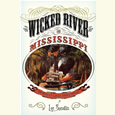Real Powers
Nicole Jarvis’ new Appalachian fantasy novel explores the seductive nature of transgression
Nicole Jarvis’ new novel, A Spell for Change, explores what the fantasy genre looks like in a 1920 Appalachian setting. Three young people struggle to find their way in Chatuga, Tennessee. There aren’t many economic or romantic opportunities in this mountain town, but Nora Jo, Kate, and Oliver are determined to make their lives bearable one way or another.

Since birth, Kate has experienced seizures accompanied by visions of the future, visions that always materialize no matter how hard she fights against them. Nora Jo thinks she’s found a way to flout rural expectations by becoming a teacher — until she’s fired and apprentices herself to a witch. Oliver has returned from the front in World War I haunted by literal and metaphorical ghosts. Jarvis skillfully plays with the fantasy trope of characters rejecting their powers at first. Often it’s hard to imagine why anyone would turn down magic. In this setting, it’s easy to understand why normal is safer.
It’s not only magic that distinguishes these three. They also skirt Chatuga’s rules and laws of conduct through their romantic interests. Nora Jo has a secret crush on a quiet farm girl named Gloria. When they confess their feelings to each other, Gloria is horrified, remembering when she was whipped by her father for kissing a girl. Kate is Black and Oliver is white in a time and place when interracial marriages are illegal, but they find themselves irresistibly drawn to each other.
Jarvis conveys the dangers for the characters in clear terms, never shying away from the realities of this era, even if the imaginative elements lend the characters more agency than they would otherwise have. One chapter from Nora Jo’s point of view explains that she “knew what the world did to those who didn’t fit in, whether it was the witch trials in Old Salem or the modern lynchings of any Black person who stepped out of line. Those who fit society got peacekeeping, the status quo. Those outside were punished with swift, brutal violence.”
With each transgression — sneaking out at night, learning spells, summoning ghosts — the characters grow closer to understanding their own potential. That potential relates to their magical abilities but is not determined by it. Their desires and frustrations are wholly natural and wholly human. When Nora Jo decides to accept a stranger’s offer to teach her magic, she explains that she “needed control, and no one else would give it to her.” Nora Jo, Kate, and Oliver want to define their own destinies.
The historic and Appalachian details in this novel make the story particularly vivid. Several pivotal scenes take place on Decoration Day, what we now know as Memorial Day. Characters choose to mourn or ignore their dead loved ones, revealing their inner obsessions. Understandably, Oliver is most affected by the cemetery rituals as he remembers his closest war friend Tucker Lee, who saved Oliver from a gas attack, sacrificing himself in the process. The guilt gnaws on Oliver’s conscience, as do the spectral visions he endures wherever he goes. “For such a young country,” he reflects, “the parade of death in America was never-ending.”
 While Jarvis is not new to historical fiction, A Spell for Change is her first novel to be set in the American South where she currently lives. This book shows an appreciation for the land’s natural beauty and an understanding of its complicated, violent past. Jarvis weaves folklore and superstition into her narrative, blending the magical elements until they seem inevitable.
While Jarvis is not new to historical fiction, A Spell for Change is her first novel to be set in the American South where she currently lives. This book shows an appreciation for the land’s natural beauty and an understanding of its complicated, violent past. Jarvis weaves folklore and superstition into her narrative, blending the magical elements until they seem inevitable.
Even with the compelling romantic plot lines, A Spell for Change centers family, offering relationships between parents and children, as well as between siblings, as potential sources of power. Not every family in this story is a happy one, but their bonds are nigh unbreakable. In fact, Kate speculates to her sister about whether a much beloved talisman is more of a memento than protection: “Maybe it doesn’t work at all, but it’s a reminder that my family loves me. That’s what most magic seems to be. Real powers like ours are rare.”
Jarvis often plays with this idea that magical ability is not more important than any other characteristic a person might have. Couldn’t Kate’s skill on the fiddle lead her somewhere special? Or Nora Jo’s education? Or Oliver’s experience? A Spell for Change is a fantasy book that works not because of its splashy special effects, but because of its respect for the sacrifices required of humans.

Erica Wright is the author of four crime novels and two poetry collections. Her essay collection Snake was released in 2020, and Hollow Bones was recently published by Severn House. Wright grew up in Wartrace, Tennessee, and now lives in Knoxville.


